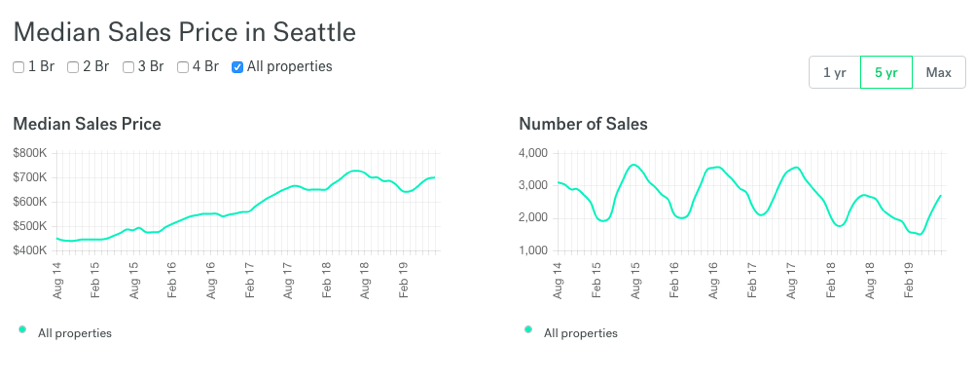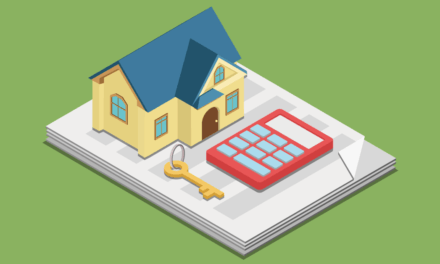When you first start looking for your dream home, you want to feel like an empowered, educated buyer, not some naive shopper who can be swindled by high-talking real estate agents. That means diving into the nitty gritty details about the real estate market, especially in your area.
- How do supply and demand work?
- What are the median home prices?
- What’s the local economy’s state?
The more you can understand what factors influence the market and how they impact your buying process, the more power you’ll have to negotiate and make smart decisions. Here are five of the biggest tips that will help you immediately get to know your real estate market, even if this is your first time ever shopping for a house.
1. Learn If You’re in a Buyer’s Market or Not
The term “buyer’s market” might sound like a term know-it-all real estate agents throw around, but in reality, it’s a simple concept. When there are lots of homes for sale but few people on the hunt for a new purchase, it’s a great time for you to be a buyer. You have your selection of buildings to choose from, and sellers can’t be too picky about their prices if there are few shoppers.
Recently, most areas in America have been in one of these buyer’s markets. However, recent reports indicate that it could certainly change in the near future, and the circumstances could be different in your immediate area.
So, how do you determine if you’re in a buyer’s or seller’s market? First things first: look at the sheer amount of inventory. If there aren’t many houses for sale near you, then it’s likely a seller’s market – they can charge more since there are fewer home options. If the reverse is true, you’ll have an easier time snagging a good deal on your first house.
2. Watch for Marketplace Cycles
When it comes to the real estate market, history is bound to repeat itself. There are typically cycles of value appreciation followed by stabilization, or maybe a decrease. The more you can understand what cycles your area’s market has gone through in the past, the better you can predict what will happen in the future.

For example, look at the Seattle real estate market. For a handful of years, median prices were steadily climbing and few houses were selling in comparison to the number of buyers interested. People were wondering when the house prices would stop increasing and when supply would finally catch up with demand.
Now, anyone involved in Seattle property management or real estate knows that prices have finally begun to drop or at least stabilize. Inventory is growing, and as a result, the number of sales is starting to climb up from 2018, too.
No matter where you live, there are real estate trends worth paying attention to. Learn what kind of cycle your market is currently in and where experts predict it will be in the future. If real estate professionals are predicting a coming influx in supply, you might be better off waiting to buy until there’s more selection.
3. How Will Coming Changes Affect Your Resale Value?
You always, always want your real estate purchase to be an investment. You’re putting your money into a building and its property, and you want that money to grow as the years go by. Fortunately, this is likely what will happen, as long as you make smart choices.
Take a look at your local economy and where the area is heading in the next decade. Will there be more jobs coming to the area, increasing the number of buyers looking for homes? What about new construction – how will that affect the number of houses available?
Consider all of the elements that could have an impact on your home’s value, then make a smart investment decision accordingly.
4. Know the Signs of Coming Growth
Even if this is your first time building or buying a house, there are telltale signs that indicate the location will be desirable to future buyers. These signs might be small, but even to a novice real estate investor’s eye, they reveal where buying a home can be a great investment.
Some of the best signs of positive growth in your area can include:
- New schools being built.
- Shopping centers popping up outside of the main city.
- Improved roads and increased construction preparing for more traffic.
Essentially, you’re looking for signs of development and community growth. Real estate is all about supply and demand at its core. If you can tell that more people are moving to an area and the demand will continue to grow, that’s probably a great place for an investment.
5. Know That Local and National Housing Markets Can Be Different
If you’re continuously reading exclamatory headlines about the national housing market in big newspapers, don’t always let those sway your opinion. Real estate is more localized than many people realize, and the markets can vary dramatically from one city to another. That’s why paying attention to your specific, local housing market is the smartest thing to do.
Another thing to remember is that people will continuously make predictions about what will happen to house prices, buyers, and sellers in the coming years. Try not to let all of the chatter disrupt you from your research into your local area’s trends, growth, and demand.
In Conclusion
Being a first-time home buyer can be nerve-wracking. You might feel out of your element and naive, but if you take away any message from this article, let it be that research can pay off. The real estate market isn’t as complicated a beast as some make it out to be. You just need to learn more about your local situation.
As soon as you understand the supply and demand of your area, as well as upcoming changes and predictions for the future, you’ll be more equipped to make a strong offer on your first house for a fair price.






